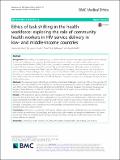| dc.contributor.author | Mundeva, Hayley | |
| dc.contributor.author | Snyder, Jeremy | |
| dc.contributor.author | Ngilangwa, David Paul | |
| dc.date.accessioned | 2022-06-07T12:54:12Z | |
| dc.date.available | 2022-06-07T12:54:12Z | |
| dc.date.issued | 2018-07-04 | |
| dc.identifier.citation | Mundeva H, Snyder J, Ngilangwa DP, Kaida A. Ethics of task shifting in the health workforce: exploring the role of community health workers in HIV service delivery in low- and middle-income countries. BMC Med Ethics. 2018 Jul 4;19(1):71. doi: 10.1186/s12910-018-0312-3. PMID: 29973217; PMCID: PMC6032788. | en_US |
| dc.identifier.other | PMID: 29973217 | |
| dc.identifier.other | PMCID: PMC6032788 | |
| dc.identifier.other | DOI: 10.1186/s12910-018-0312-3 | |
| dc.identifier.uri | https://repository.amref.ac.ke/handle/123456789/723 | |
| dc.description | © The Author(s). 2018 Open Access This article is distributed under the terms of the Creative Commons Attribution 4.0
International License (http://creativecommons.org/licenses/by/4.0/), which permits unrestricted use, distribution, and
reproduction in any medium, provided you give appropriate credit to the original author(s) and the source, provide a link to
the Creative Commons license, and indicate if changes were made. The Creative Commons Public Domain Dedication waiver
(http://creativecommons.org/publicdomain/zero/1.0/) applies to the data made available in this article, unless otherwise stated. | en_US |
| dc.description.abstract | Background: Task shifting is increasingly used to address human resource shortages impacting HIV service delivery in low- and middle-income countries. By shifting basic tasks from higher- to lower-trained cadres, such as Community Health Workers (CHWs), task shifting can reduce overhead costs, improve community outreach, and provide efficient scale-up of essential treatments like antiretroviral therapies. Although there is rich evidence outlining positive outcomes that CHWs bring into HIV programs, important questions remain over their place in service delivery. These challenges often reflect concerns over whether CHWs can mitigate HIV through a means that does not overlook the ethical and practical constraints that undergird their work. Ethical and practical guidance thus needs to become the cornerstone of CHW deployment. This paper analyzes such challenges through the lens of Ethical Principlism.
Methods: We examined papers identifying substantive and ethical challenges impacting CHWs as they provide HIV services in low- and middle-income contexts. To do this, we analyzed papers written in English and published from year 2000 or later. These articles were identified using MEDLINE, Cochrane Database of Systematic Reviews, and Google Scholar databases. In total, 465 articles were identified, 78 of which met our inclusion criteria. Article reference lists and grey literature were also examined.
Results: CHWs experience specific challenges while carrying out their duties, such as conducting emotionally- and physically-demanding tasks with often inadequate training, supervision and compensation. CHWs have also been poorly integrated into health systems, which not only impacts quality of care, but can hinder their prospects for promotion and lead to CHW disempowerment. As we argue, these challenges can be addressed if a set of ethical principles is prioritized, which specifically entail the principles of respect for persons, justice, beneficence, proportionality and cultural humility.
Conclusions: CHWs play a crucial role in HIV service delivery, yet the ethical challenges that can accompany their work cannot be overlooked. By prioritizing ethical principles, policymakers and program implementers can better ensure that CHWs are combatting HIV through a means that does not exploit or take their critical role within service delivery for granted. | en_US |
| dc.description.sponsorship | Simon Fraser University to cover the
publication fees. | en_US |
| dc.language.iso | en | en_US |
| dc.publisher | BMC | en_US |
| dc.subject | Community health workers | en_US |
| dc.subject | Ethics | en_US |
| dc.subject | Global health | en_US |
| dc.subject | HIV | en_US |
| dc.subject | Principalism | en_US |
| dc.subject | Task sharing | en_US |
| dc.subject | Task shifting. | en_US |
| dc.title | Ethics of Task Shifting in the Health Workforce: Exploring the Role of Community Health Workers in HIV Service Delivery in Low- and Middle-income Countries | en_US |
| dc.type | Article, Journal | en_US |

